Ice Fishing on Island Lake
Going for the big one: At the ice fishing derby on Island Lake, the lucky ones win a prize – or at least go home with supper.
“Cold, icy, colourful and relaxing” might well describe a sweating pitcher of daiquiris on a hot August afternoon. Or ice fishing. In February. On a frozen lake in a freezing wind. Pick your pleasure!
As it turns out, quite a number of seemingly sensible people opt for the latter at the annual Island Lake Ice Fishing Derby outside Orangeville.
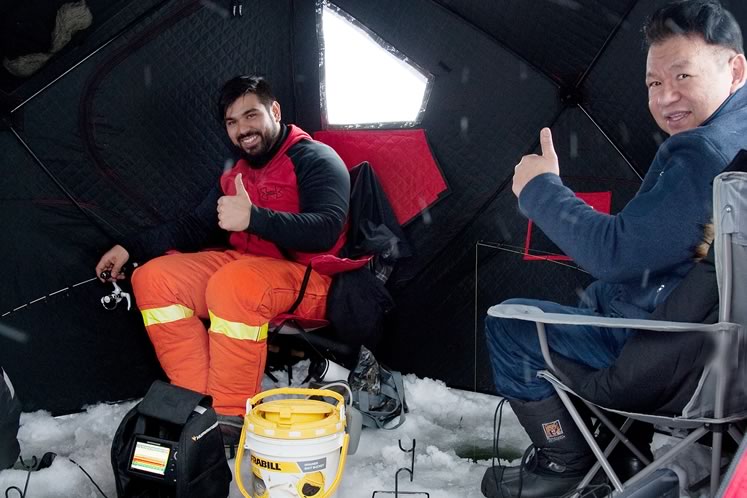
Inside a cosy hut, two fishermen give their derby experience the thumb’s up. Photo by Rosemary Hasner / Black Dog Creative Arts.
Contestants, 112 of them at $35 each ($10 for children under 12), registered online or in person, hoping for fun, fish and prizes at the 2018 derby. The lake’s summer catch-and-release Bass Fishing Derby boasts a much larger attendance, but the popularity of the winter competition has grown steadily since its launch in 1995. In 2017, 107 hopefuls with fishing licences entered, up from 87 the previous year.
Early on last February’s opening Saturday and nestled under a heavy comforter of snow, Island Lake is frozen two feet thick. The surrounding forests are frosted white. From a translucent grey sky, snow is falling. Even more is forecast and the wind is picking up. It’s winter. Serious, not-for-softies winter.
Expectant contestants with buckets of the approved minnows sold on site (to avoid outside contaminants) slog through the snow, hauling sleds laden with gear out to a growing village of multicoloured tents, shelters and huts. A few hardy souls voluntarily eschew even those amenities to fish, frigidly, al fresco. The soundtrack is crunching snow, panting, laughing and the roar of power augers. They are a community: the hopeful, the hapless and the happily well-prepared, who know all the tricks for catching fish and staying comfortable.
As I slog through the drifts covering Island Lake, a shape appears in the distance. It could be anything: man, woman, forest creature or a mound of detritus. Its identity is indistinct in the snowy haze and biting breeze, but a long trudge closer reveals a young man sitting on a plastic pail, looking down a small rod into a hole. No hut. No shelter. This is ice fishing at its most elemental – low tech, old school.
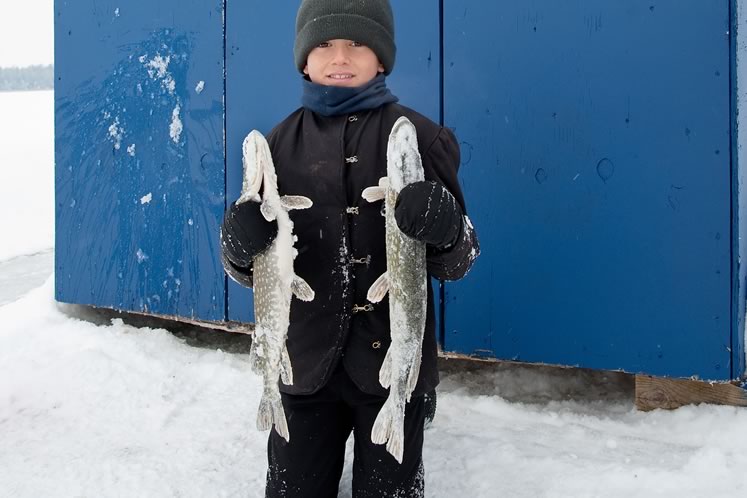
Young Keith Kuepfer caught one of these two impressive pike. Photo by Rosemary Hasner / Black Dog Creative Arts.
The young man is a 22-year-old tree trimmer from Milverton named Rodney Kuepfer. Rodney is happy and hopeful and doing what he loves best – enjoying the outdoors. He has two lines down holes (the maximum each competitor is allowed under derby rules), a tiny plastic sled filled with snacks and tackle and, apparently, no need for more. He does admit to having a cellphone. “I don’t use it more than I have to,” he says. “I don’t have any video games or anything. I’m just not one of those guys. I’d rather be outdoors than in a basement.”
This morning Rodney has caught only a middling-sized pike, which is stiffening in the snow by his feet. He’ll be here, or hereabouts (he has another hole nearby so he and his bucket can roam a little), for the next eight hours or so. “I just sit here, check my minnow to see if it is lively and hope for the best.”
The word “boring” might come to some minds, but not his. “Boring is sitting in traffic,” says Rodney. Here, there is always the chance of a sudden contest. Human versus fish. “Getting a fish gets your adrenalin going, big one or small. It’s a lot of fun. I love pulling in the fighters.” Rodney will stay the full day and happily haul out a couple more. He’ll catch several others another day without landing a prizewinner. But he’s content. Nature, cold and white, is enough.
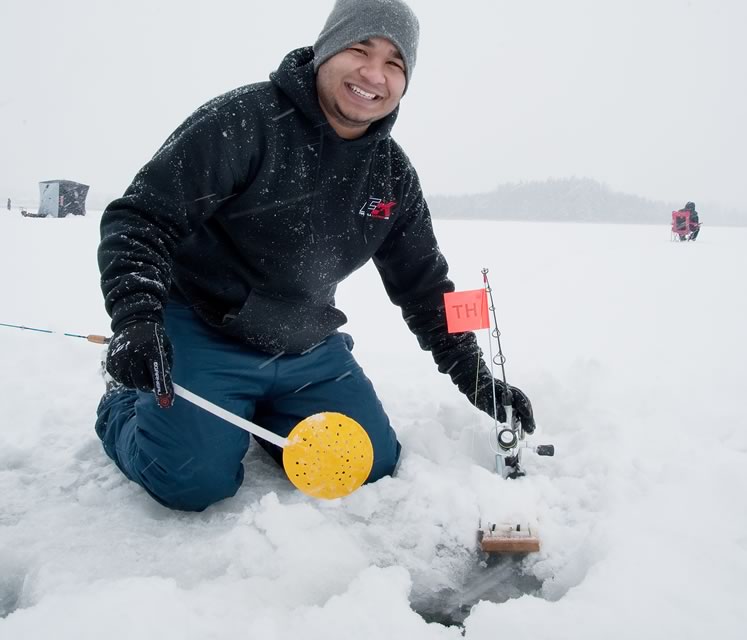
Gregory Chang-Kee uses a plastic ladle to scoop slush from his ice hole. Photo by Rosemary Hasner / Black Dog Creative Arts.
But the rigours of nature, sometimes cruel, can be mitigated. “If someone just sits down with an auger and a chair, by all means. The fish aren’t preferential. I started off like that,” says Gregory Chang-Kee, 22. “I started ice fishing on Island Lake sitting in a lawn chair in minus 32 degrees. I caught nothing. But I loved it!” That was three years ago, and Gregory’s technical progress since then has in no way diminished his love of the outdoor life. This is his third successive Island Lake Ice Fishing Derby.
In a fleece jacket heavily frosted with snow, Gregory kneels and uses a plastic ladle to scoop away crystallizing slush from an ice hole. “Embracing my Canadian heritage,” the Brampton native of Guyanese descent says with a laugh that causes the ice picks around his neck to clank. (The picks are to help him climb out should he fall through the ice.) “My Caribbean relatives would think this is crazy. The fish down there are big. For them, the fish here are tiny. Baby fish. Bait.”
Gregory’s secret for successful ice fishing is knowledge and preparation. “Do your research. Know the fish. Bring the right tackle.” The rest, he says, “boils down to comfort.” Using the jargon of the sport, he says he abandoned a “flip-over” shelter (one attached to his plastic sled full of fishing hardware) for a free-standing “pop-up,” such as the angular red one where his father and cousins relax. It features a propane heater, chairs with backs and a fishfinder. It’s toasty, but today Greg prefers the flip-over, which enables him to “run and gun” (move about trying different spots), seeking “action” (biting fish.)
Greg finished the derby’s first day “on the board” (the list of the top three fish caught in each category) with a 20½-inch pike, but was quickly knocked off. Midweek, though he wasn’t “skunked” (he didn’t spend a day with nothing to show for it), his catch was all “dinks” and “hammerheads” (tiny fish and pike no longer than the shaft of a small hammer.) Yet, smiling as always, he says, “I had a nice day. I’m warm. I’m comfortable. I’ve got family, I’ve got food [Guyanese patties and homemade tarts]. I’m in my environment.”
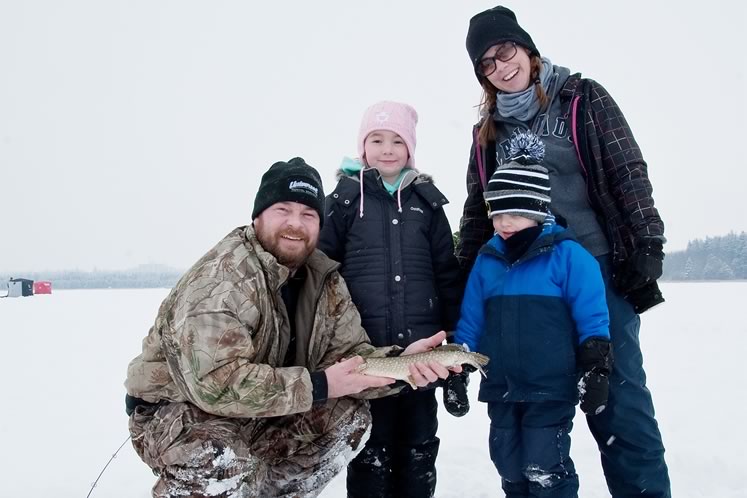
Dad Josh Sylvestre, kids Peyton and Brycen, and mom Jamie came from Kitchener for the event. Photo by Rosemary Hasner / Black Dog Creative Arts.
Josh Sylvestre gives an ice fisher’s handshake, a brief hand clasp interrupted by a 60-foot sprint and slide (according to derby rules, 60 feet is the farthest an unattended hole can be from a shelter). Josh runs down the narrow ice path he has shovelled clear to a hole where the little orange flag of a “tip-up” (an unmanned line) indicates he has a bite. “I don’t want to lose my rod down the hole,” he says. “It happens. I have to have my drag set just right.”
He does. The little rod bows, but holds, and without too much of a fight, Josh pulls up a 12-inch pike – to the undisguised delight of his youngest son Brycen, 4. “Fishy! Fishy!” the little boy cries as he dances and claps. His sister Peyton, 7, leans in tentatively to touch the pike as it flaps in the snow. “Their excitement is my excitement,” says their proud dad. “If I came away with nothing, it wouldn’t be a waste. It’s all about family.”
Kneeling for a group photo with his wife Jamie and their children, bearded Josh holds the speckled catch and beams. Josh’s father is there too. Three generations of Sylvestres dressed warmly, interacting, playing cards, barbecuing, frolicking in the snow, teaching and learning about fishing.
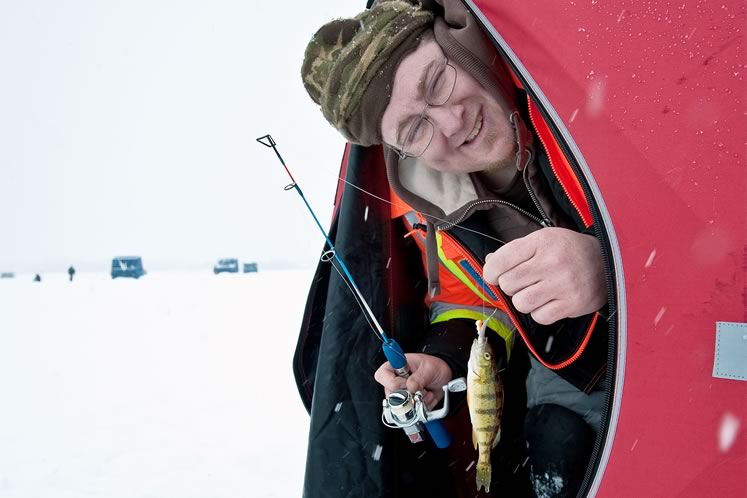
This yellow perch is not a prizewinner, but it’s worth a smile. Photo by Rosemary Hasner / Black Dog Creative Arts.
There is much to learn. It’s not all luck, although “there’s always a bit of luck involved,” says Josh. The family’s shelter and scattering of open holes are situated on the periphery of the growing community out on Island Lake. Situated precisely, according to Josh’s knowledge and experience.
“I like to attach myself to a point. That structure there,” he says, indicating what looks like snow and more snow to me, “will have deep water on either side. Fish migrate along those differences in depth.” The fish also react to the barometric pressure of migrating weather systems. They“turn off” and stop feeding, or go deeper and chill. Pick your days. Who knew? Luck really isn’t everything.
Up from Kitchener, the Sylvestre clan do well, and after their first three days on the ice, Josh stands third, with a pike of just over 22 inches, the longest he would catch. For a while, his kids rank first and second among children. And his father, Doug, initially leads the derby, with a 27¼-inch pike that would eventually win him the $750 prize for second place. The family followed their daily rankings together online.
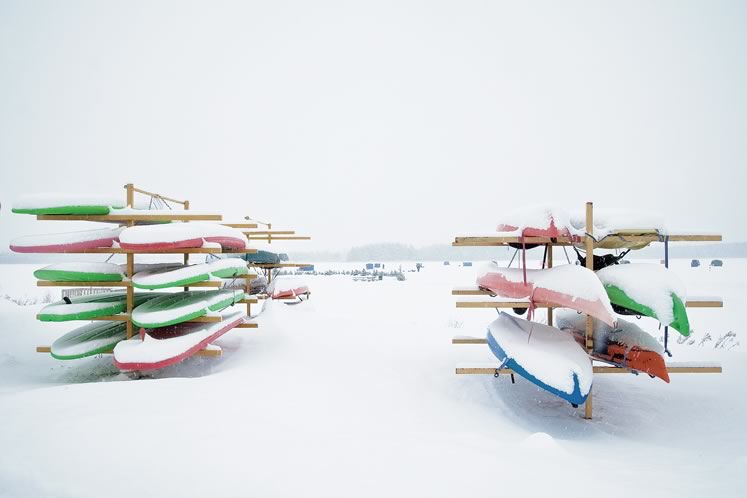
A view of the derby from the Island Lake Rowing Club. Photo by Rosemary Hasner / Black Dog Creative Arts.
Midway through the derby, the lake is bleak and windblown. The weather has changed. The temperature is well above zero and the slush on the lake is ankle deep. Only 11 rental huts (smoking and nonsmoking) and a few sodden zealots over open ice holes dapple the grey, mid-morning horizon. Under the slush, however, the lake is still solidly frozen so there is no worry about “Swiss cheesing” (what happens when the warmth causes the holes in a hut to merge into one big hole that swallows the hut).
Retired electrician Jim Galloway has come from Tottenham. He wears a grey beard and an outdoorsman’s ensemble of heavy plaid jacket over a hoodie, camo snowmobile gloves and a Black Watch cap. He carries a small tool box containing tackle, as well as two stubby rods and a satchel of lunch. Walking with a stick and on two prosthetic knees, he is steadied by his nephew, Mike Trippler of Mono. The two soak their trouser cuffs wading through four inches of water to enter rental hut 3.
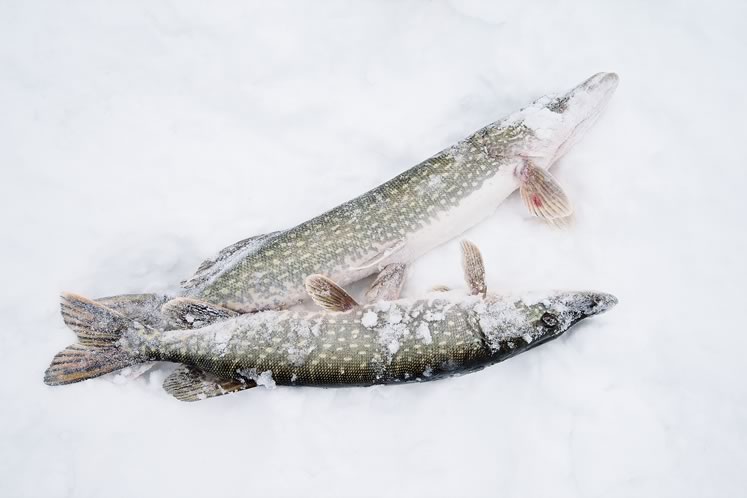
A pair of northern pike. The derby offers cash prizes for the longest northern pike, yellow perch and black crappie. Photo by Rosemary Hasner / Black Dog Creative Arts.
The hut is basic. Very basic. A well-worn plywood box, painted navy and mounted on timbers. Inside is unpainted. A low peaked roof and two opposing benches overlook a gaping rectangle of ice and water where most of the floor should be. If you are planning to swing a cat, best step outside. Amenities are a propane heater, a small plexiglas window and two brass coat hooks. The hut has no frills, no basement and no curb appeal. But it may have fish.
At 74, Uncle Jim is novice ice fisher. His initiation was the previous day. Why is he here? “Because I was invited by my nephew,” he says, dropping a “spreader” (two baited hooks separated on either side of a small lead sinker) into one of the four holes uncle and nephew are allowed. “Why not? You gotta have something to do or you’ll go crazy. I like it. Having no luck [the previous day] isn’t a big put-off,” he says with a contented grin.
“We talked. Sat here and talked. He’s good company.” Couldn’t they talk somewhere upholstered, over a drink, with no stiff breeze whipping under the walls? “We could do, but we wouldn’t be alone in a bar. It is one-on-one here. It’s relaxing. You don’t even have to catch a fish…”
If Jim should catch something, it might be awkward. He is not registered in the derby. Registered entrants call in a catch and marshals snowmobile out to measure and photograph it to authenticate claims. Jim smiles mischievously. “If I catch a big fish, I might leave it here, go up and register for the contest and then call them!”
Perhaps Mother Nature caught wind of his contemplated ploy and disapproved. Though Island Lake didn’t open and swallow him, Jim was skunked for two days straight – four holes, 10 hours, no fish – though nephew Mike did land a biggish bass late on day two. Nonetheless, Jim is a happy man. He smiles. “I gave up a few minnows. It’s the companionship more than anything.”
Marketing specialist Gigi Gittins, 28, and Shannon Lyon, 31, an outdoor adventure manager who grew up in the hills and once worked at Island Lake, have come up from Toronto with some girlfriends. Sitting, unsheltered, on a folding chair, over a shared ice hole, Gigi says with delightful idealism, “I had a kind of romanticized ice fishing in my head – all things wintery and Canadian. There is something extraordinary about sitting out on a frozen lake. I was excited to be in nature. I like winter. I like how it all gets calm and goes quiet. Everything is washed out but brought to life at the same time.”
Brought to life, but unenlivened by an actual fish. Gigi caught nothing on her first and only day of ice fishing, not even a cold. Yet she is undeterred. “Sure. I’d do it again,” she says, rosy-cheeked and smiling. “At the end of the day, I went for the people and to connect with nature in a new winter sport. There is no bad weather, only bad clothing.”
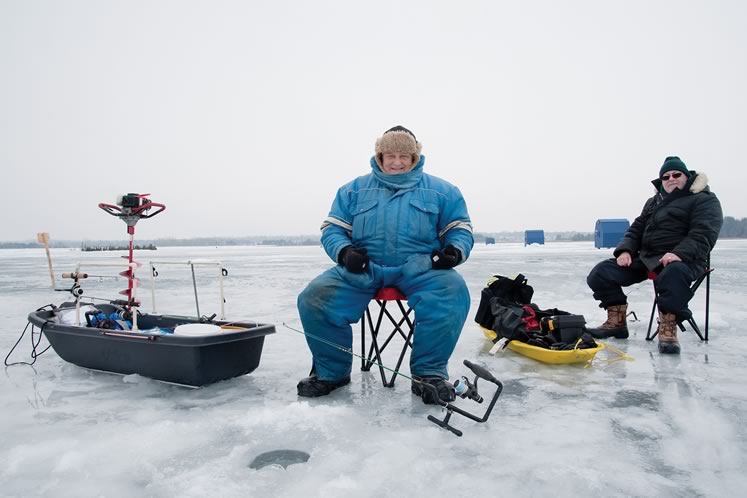
Doug “Papa Smurf” Wallace (left) has rarely missed a year over a decade and a half of derbies. Here he relaxes with his fishing buddy John Martin. Photo by Rosemary Hasner / Black Dog Creative Arts.
Nearby, “Papa Smurf” wears good, if well-worn, clothing. On the ice, everybody knows Alliston’s Doug Wallace, but few by his name. Big, jolly and buried in his habitual blue snowmobile suit, Doug is happy to be known as Papa Smurf, a name acquired when he wore that suit on his first day at an Island Lake Derby 15 years ago. He has missed only few derbies since and picks the same spot when he comes. “It has always done me well.”
This year is no exception. Doug’s best pike is almost 26 inches long – close, but not quite a prizewinner. He took second place several years ago with a 32-inch fish. But win or lose, Papa Smurf plans to “enjoy the lake and try to fill my freezer. I eat them all year long. Pike and walleye are the best-tasting fish, in my mind.” Especially those pulled from a frozen lake. “The colder water makes for a much tastier fish.”
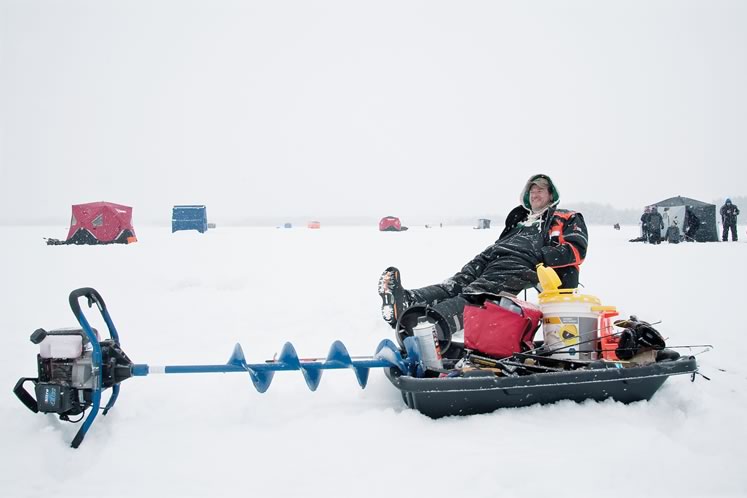
Life is sweet when you have all the gear. Photo by Rosemary Hasner / Black Dog Creative Arts.
What changes has Doug seen since the derby’s early days? “The prizes have got better. More sponsors. And they’re pretty well set on the rules now. They used to flip-flop a bit” – on whether to use fish weight or length to determine prizes, for example. But he has witnessed the most profound changes in the lake itself. “It’s a shallow lake. There are a lot of fish in there, but it’s nothing to the way it used to be. It’s got so popular. A lot of fish are taken out. We used to get our limit [six pike] every day. That’s getting tougher.”
At one time, Island Lake was stocked with fish, but no longer. “It maintains itself” and “fish of good size and quantity” are still available to be caught, according to Yasmine Slater, superintendent of both Island Lake Conservation Area and Ken Whillans Resource Management Area.
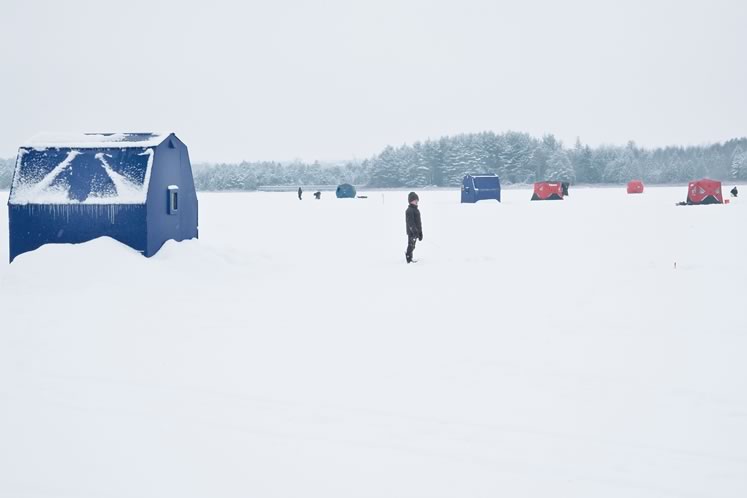
A variety of huts dot the ice on Orangeville’s Island Lake during the 2018 ice fishing derby. Photo by Rosemary Hasner / Black Dog Creative Arts.
Out in the elements, sitting alone on his stool between two lines, what is Papa Smurf thinking? “How lovely it is. How quiet. Just waiting for that fish, clearing the ice, watching your minnow run, that keeps you busy. The odd time I’ll turn my radio on, sit and watch my rods and listen to a bit of country music. I live to fish.”
Over the 10 days of the derby, the weather ranged from miserable to mild. Fish from below two feet of frozen lake were hooked, landed, measured, recorded on spreadsheets and posted – to be subsequently superseded and erased – on a leader board. Waiting to see who had taken the lead might even be called nail-biting, but only for those foolish enough to remove their gloves. The winning northern pike measured 31 inches. A little girl’s winning 24-inch pike was half as long as she was. But only a few really cared. Some caught supper, most had fun, and many will come back in 2019. Hoping.
A final note: Sadly, Jim Galloway’s first ice fishing experience was also his last. He died in April, as the winter ice was leaving Island Lake.
Island Lake ice fishing 2018
Ice fishing is permitted on the lake from January 1 through mid-March, depending on ice conditions.
The 2019 Island Lake Ice Fishing Derby will run daily from February 9 to 18, ice conditions permitting. A prize of $1,000 will be awarded for the longest northern pike; second- and third-longest will win $500 and $250 respectively. The longest yellow perch and black crappie win prizes of $500 each, and various prizes will be awarded in children’s categories. Family Day weekend is a special time, when lots of additional activities for children are planned.
Fishing licences, required except on Family Day weekend, can be obtained from the Ontario Ministry of Natural Resources and Forestry.
Heated huts, augers, minnows and other supplies are available for rent. When ice conditions are deemed dangerous, signs are posted, the park gates are closed and alerts are announced on the Credit Valley Conservation website.
Then wear heavy socks and keep your fingers crossed!








